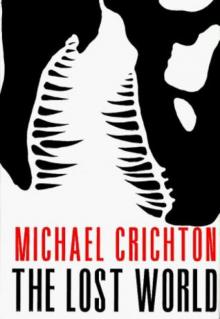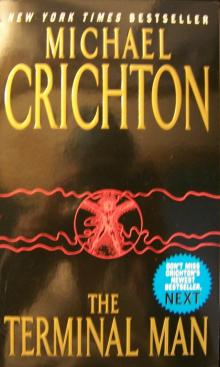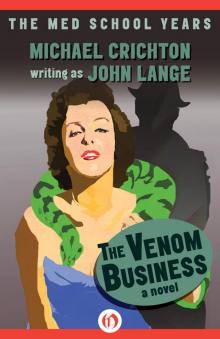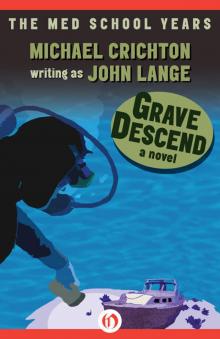- Home
- Michael Crichton
Odds On: A Novel Page 12
Odds On: A Novel Read online
Page 12
“Yes,” she said. “I am. What time?”
“Nine?” Again, a question, not a statement.
“All right,” she said. Then, grudgingly, “Thank you.”
He nodded, still keeping his eyes on the road. She was more subdued, but some extra sense told him the battle was far from over.
Bryan met Annette by the salt-water pool. She was wearing a white cotton pullover and pink capri slacks, and she looked very fresh and desirable.
“Hello,” Annette said. He noticed that she carried a neatly rolled towel under one arm, and he was glad he had had the foresight to bring along his swimming trunks.
“Where are we off to?”
“Do you mind walking a bit?” He shook his head. “Good. I’ve been here a year, and I know the coast very well. There’s a wonderful little place we can go to, if you don’t mind fighting some brambles.”
“I’m game.”
They walked around to the front of the hotel, across the bridge, and abruptly turned off into the hills. He noticed that they were following a path, narrow and indistinct, but a path nonetheless. It climbed one sandy, red hill, then followed down the other side. The hotel, high as it was, disappeared from view. Birds in the nearby, scrubby pines chirped and twitted; the breeze was gentle and soft. As they continued on, the path disappeared, and soon Annette struck out to the right, toward the sea. Thorny bushes clung to his legs; he could understand why she had worn slacks.
They descended, fighting for balance in the loose earth, and came at last to a small beach, completely hidden from sight from above.
“We’re just around the corner from the hotel,” Annette said. “I don’t think anybody knows about this place except me—and now, you.” Her voice had a hint of conspiracy, like one child showing another his secret tree-fort.
“I won’t breathe a word,” he promised. The water lapped at the pebble beach, and it was very quiet. He had a strong sense of being alone with her, and of being responsible for her in an odd way. She stood next to him, waiting for his reaction. He kissed her, almost unwillingly, very gently.
“How do you like this place?”
“It’s marvelous.” To his surprise, he felt a slight irritation that she was not more moved by his kiss. The whole damned business was annoying and he was filled with conflicting emotions.
She spread her towel on the beach, and anchored it with rocks at the corners. She tossed a green print bikini down on the towel, straightened, and looked at him. Her hand went to the zipper of her slacks. “Would you admire the view?”
“With pleasure.”
She pointed to the ocean. Obediently, he turned his back to her. He heard the sound of her zipper, and the ruffling sound of her pants dropping to the ground. There was a brief silence, then a snapping sound—her bra—followed by another silence. He felt nothing at all, certainly none of the intense eroticism he might have expected. Instead, he felt as if he were far off, looking down on this little beach from a great distance, seeing a man staring at the sea, and a girl undressing behind him. It was a weird vision, lonely and surrealistic.
He shrugged and lit a cigarette.
She came around and faced him, momentarily striking a comic, pinup pose.
“You pass inspection,” he said lightly. “Shall we take a swim?”
“I’ll wait for you in the water.” She ran down the beach and plunged in. He slipped into his trunks, trying to assess his feelings, and got nowhere. With a sense of relief, he threw himself into the water, and swam out toward her.
Later, they lay in the sun, feeling the salt dry on their skin. He was on his side, head propped on his hand, looking at her as she lay on her back, facing the sun. As he watched her, he had a sudden image of Jane, lying in bed as the rain pounded on the window. He had a sudden twinge of feeling, which might have been conscience, but could as well have been regret.
They talked for an hour, and it was productive; Bryan picked up a good deal of useful information, particularly about Mr. Bonnard’s routine, and about the night staff. He discovered that nobody kept watch over the pier and pools at night, and that was of critical importance. Most of the servants lived on the mainland, another important point—Jencks had been unsure how many spent the night on the island. He found out a little about which guests were particularly wealthy.
When they finally decided to go to Gerona for the rest of the day, a certain detached part of him was pleased. Another was depressed, for he had discovered what he had feared all along, that he was growing very fond of her.
By the pool, Miguel pushed aside the leaves of the potted palm and watched Big Brad Allen lumber across the concrete deck. He headed directly for the little lady with the bananas and drew up a chair at her table. He didn’t lack nerve, that was for sure. The two talked quietly for several minutes; then the old lady put down her book and listened with full attention.
Miguel was disturbed. He had awakened late and had found that both Jencks and Bryan were gone when he phoned. Not knowing what to do, he had followed Allen during the morning and had watched him travel unctuously from one group of guests to another, talking, laughing, buying drinks. It looked, from a distance, like a con game, but you could never tell.
Allen finished talking with the old lady and stood to leave. He pointed to her half-empty glass, and she shook her head. He bowed politely and walked off. Soon he was talking with a lanky man in a broad straw hat. Apparently, he seemed intent on meeting everyone at the hotel.
Miguel got up and walked inside to the lobby. As he passed the elevator, he considered visiting Cynthia, but decided against it. He was not in the mood.
He found the manager behind the desk.
“I’m sorry,” he said, “but I have something terrible to ask.”
Mr. Bonnard looked sorry, too.
“A man checked into the hotel yesterday evening, a big man with a red face. He’s out at the pool now. I’m sure I know him, a business associate from somewhere, but I can’t place him. Can you tell me his name?”
“I think so.” Mr. Bonnard shuffled through the registration forms, found one he wanted, and put it down on the desk. Casually, Miguel looked at it. “Mr. Brady is the man, Alan Brady.”
Miguel frowned, and scratched his head. “Brady, Alan Brady.” Suddenly he snapped his fingers. “Of course—Al Brady!”
Mr. Bonnard smiled.
Miguel smiled.
He left the desk, still smiling, and returned to the pool. He had read the card, and had the room number—51.
Back at the pool, he found Brady talking to a girl in a blue-and-white checked bikini. She did not seem very interested, and neither did he. Miguel took up his seat by the potted palm and watched. He noticed that none of the guests who had already met Brady paid him any attention; they were oblivious to his wanderings. In a way, that was a sign of great skill on Mr. Brady’s part.
“Oh really?” Jencks said.
“Why yes,” the lady replied. They were sitting in the bar, drinking lemonade. She was American, tall, bony, and aristocratic in a plain way. “I have always taken champagne baths. Not pure champagne, of course—just a bottle or two in the water. If you use dry champagne, it’s simply marvelous. I even induced my friend Gertrude to try it, and she’s so stodgy; if she can do it, anyone can do it, I always say. Gertrude must be the stodgiest person I know. Even her bridge game reflects it. Stodgy.”
Jencks nodded wisely. Mrs. Cleeves continued her discussion of stodginess in the human species, liberally sprinkling it with examples from her acquaintance. She was a middle-aged, wealthy Connecticut bore, but he listened patiently. His occasional questions were sufficient to steer her monologue in the direction he wanted, and she had the fortunate habit of following any thought to its most detailed conclusion. When finally she got around to it, she mentioned that she was traveling alone—separated from Eric, her dreadful second husband—to meet her nephew, who was working for A.I.D. in Afghanistan, a miserable job but you know the pioneering spirit of the y
oung. Still, travel was so strenuous, and she had to worry constantly about her “things.” She didn’t know why she had brought them; jewels certainly wouldn’t be any use in Afghanistan. Force of habit, she supposed. Jencks nodded in agreement. Half an hour later, she mentioned her room number. Fifteen minutes after that, Jencks was desperately looking for a way to break away.
He saw Miguel at the entrance to the bar. Miguel beckoned.
“You must excuse me,” Jencks said. “I have to see this fellow. It’s been very pleasant.”
He left before she could protest.
“Anything wrong?”
“Yes. There’s a crook in the hotel.”
Jencks’ eyebrows went up. Somehow, he knew what was coming.
“A big fat guy,” Miguel said, “named Brad Allen. He’s registered as—”
“Alan Brady,” Jencks said.
“You know him?”
“He borrowed my passport on the plane from Madrid to Barcelona. Looked at it, slipped it back to me. He had me tailed in Barcelona. Is there a skinny runt with him?”
“No,” Miguel said.
“What’s his game?”
“Straight con, as far as I know. Very good.”
“I can imagine.”
Miguel lit a cigarette. “He’s staying in room 51. Should I search it?”
“No,” Jencks said. “Not yet. I want to think about this for a while.”
He wandered off, deep in thought. All his earlier misgivings returned to him; this could not be coincidence, could not be mere chance. The odds against this chain of events were incredibly small. Brady must be following him, must be after something, or afraid of something.
He considered every possibility and drew the same blank he had drawn before. Unless Bryan had talked—and that was very doubtful—Brady could not know what Jencks intended. Therefore, he must be here for another reason. That was the only logical conclusion.
He didn’t like it. His brain accepted that, but his instincts rebelled. There was only one thing he could do. He went out to the pool to make arrangements with Miguel.
“You’re out of your goddamned mind,” Peter said.
“Shut up, and don’t make a scene,” Jenny replied. She jumped off the pier into the water, and slipped into the skis. A short distance away, the boat was idling, its motor putting softly.
“I wanted to talk to you, not water-ski.”
“You can talk to me, but you’re not going to spoil my fun. Are you coming? I can’t wait all day.”
Furious, he dropped into the water, and struggled with the rubber foothold in the skis. He was not a strong swimmer, and he had trouble staying afloat. For that matter, he was not a good water-skier, though he had tried it once or twice. He regarded it as a dangerous sport, like mountain climbing or skindiving in shark-infested waters. You could break a leg—or your neck—water-skiing. It was ridiculous.
“Having trouble?” Jenny laughed.
“No. I’ll be ready in a minute.” He swallowed some water as he spoke and broke out coughing. It was embarrassing.
“Maybe you’d be happier with a life jacket,” Jenny said, observing his difficulties.
“I told you, I’ll be ready in a minute.”
“All right, all right.”
The man in the boat threw them two ropes. Jenny took hers and handed the other to Peter. Their hands touched briefly, but it was cold and impersonal.
“Listen,” Peter said. “I want to talk to you about our engagement. I have to tell you that you are acting in a manner—”
“Ready?” the man in the boat called.
Jenny waved to indicate that they were, then turned to Peter. “You were saying?”
At that moment the boat started, and they were both drawn forward, slowly at first, and then lifted up. Peter felt the wind on his dripping body; it was cold. They began to go faster. He shivered, tensed, and fought for his balance.
“Yes?” Jenny called to him, laughing.
They were drifting apart, he to the left of the wake, she to the right. “I don’t know what kind of a game you’re playing,” he shouted, “but I won’t stand for it. Do you understand?”
“I can’t hear a word you’re saying.” she shouted. He heard her distinctly.
She began to come toward him, and he ducked. Her rope passed over his head. He crossed the wake, bouncing and fearful, and their positions were reversed.
“Whee!” Jenny shouted.
“You’re being insulting!”
“Whee!”
“Childish!”
She laughed. “Isn’t this fun?”
“No!” he screamed.
She shook her head pityingly.
“Don’t give me that shit! I want an explanation.”
“Can’t hear you. Sorry.”
“Then listen!”
“What did you say?” She was cocking her head toward him, an amused smile on her lips. Then she was coming toward him again; again, he ducked, and they changed sides. As she passed him, she said, “Scared, sweetie?”
“Damn you!”
They were moving out from the coast into rougher water. The wind was picking up, and he was bouncing. It was difficult to maintain his balance. Jenny didn’t seem to be having trouble. Where had she learned to water-ski, anyway?
She made a signal to the man in the boat. They picked up speed. She was trying to dump him, waiting for him to fall. She had planned it from the start, with the intention of humiliating him.
“Who do you think you are?” he shouted, but he could hardly hear his own voice in the wind, now, and he knew that she was not fooling when she shook her head.
And then, quite suddenly, his left leg twisted out and up, and he felt himself lifted up, spun sideways, and flung into the water with a hard slap. The cold water enveloped him. When he broke surface, he saw the motorboat circling around, coming back. It passed him, then slowed, and Jenny sank gracefully into the water beside him.
“Did you hurt yourself?”
“No, dammit.”
“Don’t be angry, Peter. You should have said you didn’t know how to water-ski in the first place. I wouldn’t have made you go with me, if I’d known.”
“You didn’t make me go with you, and I do know how to water-ski.”
“I must admit, you did well for a beginner.”
“Now you listen to me,” he said. “I can take only so much. I’ll give you another day to come around, and if you don’t, you’ll have to suffer … suffer the consequences.”
She nodded politely.
“Better grab your rope,” She said, “I think we’re about to be taken in.”
“Did you hear what I said?” he demanded, his voice taut with anger.
“Yes, Peter,” she said soothingly. “I heard.”
Jean-Paul knocked on the door and waited. The package, wrapped in a newspaper, was under his arm. He looked up and down the hall nervously, but there was nobody in sight.
Anyway, he had nothing to worry about. Who would know? Who would even suspect?
The door opened, and he found himself staring into the eyes of a dark and beautiful girl. She wore a bulky, shapeless sweater that came just below her hips, but her long, slim legs were bare. She wore no slippers.
“Yes?”
“I am Miss Shaw’s chauffeur.”
“Oh.” Cynthia smiled radiantly. He liked her slanting eyes, her dark skin, her full lips. He particularly liked the long black hair that flowed over her shoulders. “Please come in.”
He entered the room and shut the door behind him. She walked to the dresser, picked up a drink and sipped it. She seemed perfectly at ease and surveyed him coolly. “Not bad,” she said. “But Aunt Elizabeth always did have good taste in men, considering her age.”
“Aunt Elizabeth?”
“Yes. She’s not really my aunt. It’s just an affectionate term. We met in London a while ago. Where did she pick you up?”
“Tangier.”
Cynthia nodded thought
fully, then waited. “Well?”
“Oh,” Jean-Paul said, remembering the newspaper. He had been daydreaming, staring at her firm legs, with their smooth muscles. He wondered if she was wearing anything beneath the sweater and guessed she wasn’t.
He handed the newspaper to her, and Cynthia took it eagerly. She set it down on the dresser, opened it and took out the gray package. He wandered around the room and noticed the Polaroid camera.
“You have one, too?” he asked, picking it up.
“Yes,” she said.
“You mean, you’re …
“Yes. I’ve gotten quite good with it.”
“So have I,” Jean-Paul said.
He saw that she had opened the gray package, displaying a heap of packed, green, grainy material. With her fingers, she felt the texture, then smiled. “It’s good stuff. Nice and pure. Ever tried it before?” Her eyes were on him; he could feel them gauging him.
“Of course,” he said.
She smiled. “Why don’t you stay a while, and share a couple of cigarettes with me?”
“All right,” he said, trying not to think of her legs.
She sat down on a chair and crossed her legs, then raised one and pointed it forward. The skin was smooth and taut, dark brown, and lightly oiled. “My name is Cynthia,” she said, relaxing the leg.
“Jean-Paul.”
“You look strong, Jean-Paul.”
He shrugged.
“Don’t be embarrassed. I like strong men. Why don’t you make some sticks while I change clothes?”
He nodded numbly, disappointed to see her enter the bathroom. Reaching into his pocket, he withdrew a packet of Marlboros and began squeezing one of the cigarettes, rolling it in his fingers. The tobacco fell out in long strands. He continued to work it in his hand until it was an empty paper tube.
“You want it straight, or mixed with tobacco?” he called to her.

 Dragon Teeth
Dragon Teeth Jurassic Park
Jurassic Park Micro
Micro The Great Train Robbery
The Great Train Robbery The Andromeda Strain
The Andromeda Strain The Lost World
The Lost World Congo
Congo Travels
Travels Timeline
Timeline Sphere
Sphere Westworld
Westworld Prey
Prey State Of Fear
State Of Fear Next
Next Disclosure
Disclosure Pirate Latitudes
Pirate Latitudes The Terminal Man
The Terminal Man Five Patients
Five Patients Rising Sun
Rising Sun Binary
Binary The Andromeda Evolution
The Andromeda Evolution Airframe
Airframe Easy Go
Easy Go Drug of Choice
Drug of Choice Odds On: A Novel
Odds On: A Novel Scratch One
Scratch One Dealing or The Berkeley-to-Boston Forty-Brick Lost-Bag Blues
Dealing or The Berkeley-to-Boston Forty-Brick Lost-Bag Blues Venom Business
Venom Business Grave Descend
Grave Descend Gold - Pirate Latitudes
Gold - Pirate Latitudes Binary: A Novel
Binary: A Novel Zero Cool
Zero Cool Delos 1 - Westworld
Delos 1 - Westworld